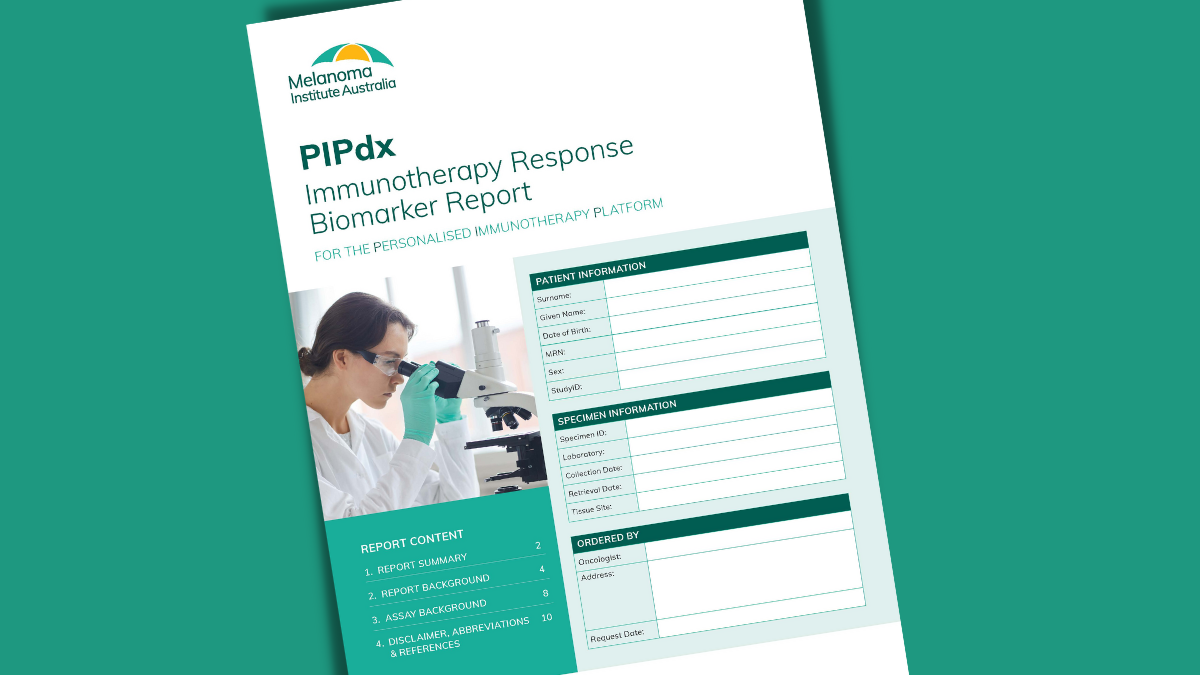The Personalised Immunotherapy Platform (PIP) is a tool developed by Melanoma Institute Australia to ensure advanced melanoma patients receive effective treatment the first time, based on their own genetics and tumour biology. PIP enables the identification of patients who are likely to respond to standard treatments and those that require novel agents as part of a clinical trial to save their life.
Background
Immunotherapies were first tested and adopted as treatment for melanoma and are now the most widely used drug therapy in cancer. Immunotherapy helps the body’s immune system to recognise cancer cells as foreign and to attack them.
Currently, there are ten approved drug therapies subsidised by the Australian Government on the PBS for metastatic melanoma. These drugs include checkpoint inhibitor immunotherapies (nivolumab, pembrolizumab and nivolumab combined with ipilimumab).
Immunotherapy is successfully curing a large proportion of patients with advanced melanoma. However, 50% of advanced melanoma patients either don’t respond to, or develop resistance to, the same immunotherapy treatment that proves lifesaving for others.
It is therefore critical for clinicians to be able to predict resistance to standard treatment and to identify alternative effective drug therapy options to improve survival, reduce unnecessary to drug related toxicity, and decrease costs to patients.
Providing the right treatment to the right person at the right time will not only save lives, but it will also reduce the physical, emotional, and financial costs of a patient having to go through several treatments with no certainty they will work.
PIPdx
PIPdx constitutes a suite of biomarker tests which can be combined within artificial intelligence-based models to predict the response of a given patient to anti-PD-1 monotherapy (nivolumab or pembrolizumab), or combination anti-PD-1 + anti-CTLA-4 (ipilimumab).
The PIPdx tests combine information from the patient’s tumour, which includes DNA mutations, cell signalling pathways, immune cell infiltration, along with the patient’s disease characteristics to generate a prediction of their likelihood of responding to standard of care immunotherapies.
PIPdx also aims to inform the selection of novel treatment options for those found to be unlikely to respond to standard treatments. PIPdx profiles the protein and gene expression of alternative immunotherapy drug targets within the patient’s tumour to identify specific trial agents which might be more suitable for the patient’s disease. PIPdx will enable a rational process to select treatment with the greatest chance of a cure for individual patients.
Click on the report cover to see an example PIPdx Biomarker Patient Report. The report shows an overview of the biomarkers, and details how to interpret the results.
PIP PREDICT
PIP PREDICT is a clinical study that is prospectively evaluating the use of the PIPdx test in oncology clinics. Its aim is to access the accuracy and usability of the platform in the real-time clinical setting on patients as they present in oncology clinics.
PIP PREDICT is currently enrolling, testing and delivering the biomarker reports for patients enrolled into the study.
The eventual response predictions generated for each patient will be compared to the original prediction. PIP PREDICT has the potential to transform treatment for advanced melanoma patients and revolutionise treatment of other cancers worldwide.
Key eligibility criteria:
- Stage III or stage IV melanoma (cutaneous, mucosal, acral, subungual, uveal or unknown primary melanoma), or NMSCs (MCC, cutaneous SCC, or BCC).
- Availability of a melanoma tissue sample which was obtained within last 2 years.
- Prior treatment with BRAF / MEK inhibitors is acceptable.
A Translational Research Programme of the Melanoma Institute Australia. Protocol Number: MIA2020/283. HREC reference number: 2020/ETH00426
For more information please contact:
Melanoma Institute Australia (Sydney, NSW)
E: PIP@melanoma.org.au
PIP Clinical Trial
The PIP Clinical Trial is a world-first clinical trial that utilises the PIPdx to identify patients in need of novel clinical trial agents and quantifies the presence of each drug target in the patient’s tumour. This information will then be used to stratify patients into novel treatment arms.
The PIP-Trial is an investigator initiated, multi-centre, adaptive, randomised, multi-arm clinical trial. It will evaluate:
- biomarker driven treatment selection of novel agents against standard combination checkpoint inhibitor therapy in metastatic melanoma for those predicted unlikely to respond to Pharmaceutical Benefit Scheme (PBS) subsidised therapy (Part A of the Trial)
- biomarker-driven treatment selection in those with no response to PBS-subsidised standard therapy (Part B of the Trial).
The clinical trial is being led by Melanoma Institute Australia, and aims to enrol patients across multiple centres including MIA’s The Poche Centre in Sydney.
Enrolments for the PIP Clinical Trial will commence in 2023. More details will be published on this page when available.
Key inclusion criteria
• Metastatic melanoma
Sites and contacts
The PIP Clinical Trial will be run out of various sites from 2023. Contact details for each location will be published on this page when available.
NSW
Melanoma Institute Australia (Sydney, NSW)
E: Maria.Gonzalez@melanoma.org.au
T: (02) 9911 7300
Read more about PIP
MIA launches world-first tool to predict immunotherapy response
New clinical tool developed by Melanoma Institute Australia hailed a breakthrough in personalising treatment for all cancer patients.


